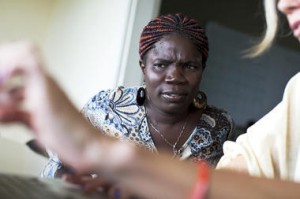It’s late afternoon in Todee, a village in rural Liberia, and the sun is starting to drop. Mae Azango settles into a taxi for the three-hour drive back to Monrovia, the capital.
In the taxi, her phone rings. She’s been ignoring it all morning – she’s been working – but now she can answer. She listens quietly, and then she bursts into a belly laugh.
This is not a good sign.
Azango laughs all the time – but often not out of joy. She laughs out of disbelief, or disgust, or sheer frustration. For her, laughter is an indictment or a protest – a sign not that she feels carefree, but that something around her is terribly wrong.
The sudden guffaw in the back of the taxi, though, ends as quickly as it began.
“OK, OK, I hear you,” she says. Then she hangs up, shaking her head. Her editor has been calling her all day, she explains, trying to tell her to get out of Todee. “The reaction to the story,” she says, “is too much.”
That story is her cover-page exposé of female circumcision, a traditional rite of the Sande. The Sande is Liberia’s secret society for women, and 10 of the country’s 16 tribes still use female circumcision to mark a girl’s transition to adulthood – and her membership in the Sande.
Azango had gone undercover in Todee weeks before as part of her investigation into the ritual and its effects. She knew the story would cause controversy. Even though Liberians all know about the practice, often referring to it as “cutting,” members of the Sande swear an oath to never speak about the society at all, and no one else talks publicly about cutting.
Or hadn’t, until Azango’s story.
“People are saying we have exposed a secret, a women’s secret, blah, blah, blah,” Azango says. She had known there would be controversy. “I expected to get a tongue-lashing,” she insists. But her editor had told her it was worse than anyone thought.
“You better move from Todee,” she had told Azango, “because those people will grab you and put you in the Sande bush.”
Azango and her editor understood what that would mean: They wanted to circumcise Azango. It would be a punishment for violating the taboo, and it would be an assurance that she’d never write about the topic again. Anyone who breaks the oath and tells others what happens in the bush is killed.
This wasn’t your average reader’s complaint. This was a death threat.
But Azango was supposed to come back to this village – the same place her editor says she’s no longer safe – on Monday to finish the story.
“What will you do?” she was asked.
She laughed louder than she’d laughed all day.
The story was meant to provoke. After all, that’s what Front Page Africa does. As Liberia’s leading investigative daily, the paper publishes 1,500 copies a day, all printed overnight on an old-fashioned press, each copy folded by hand. But its audience is much wider: The newspaper usually sells out within hours, and as with a single copy of any of Monrovia’s many daily papers it might pass through a half-dozen hands.


